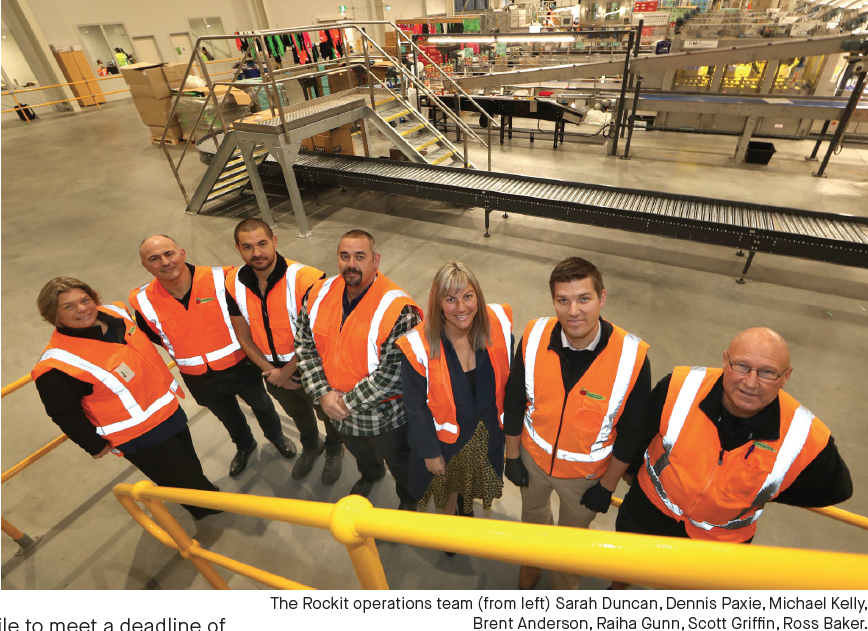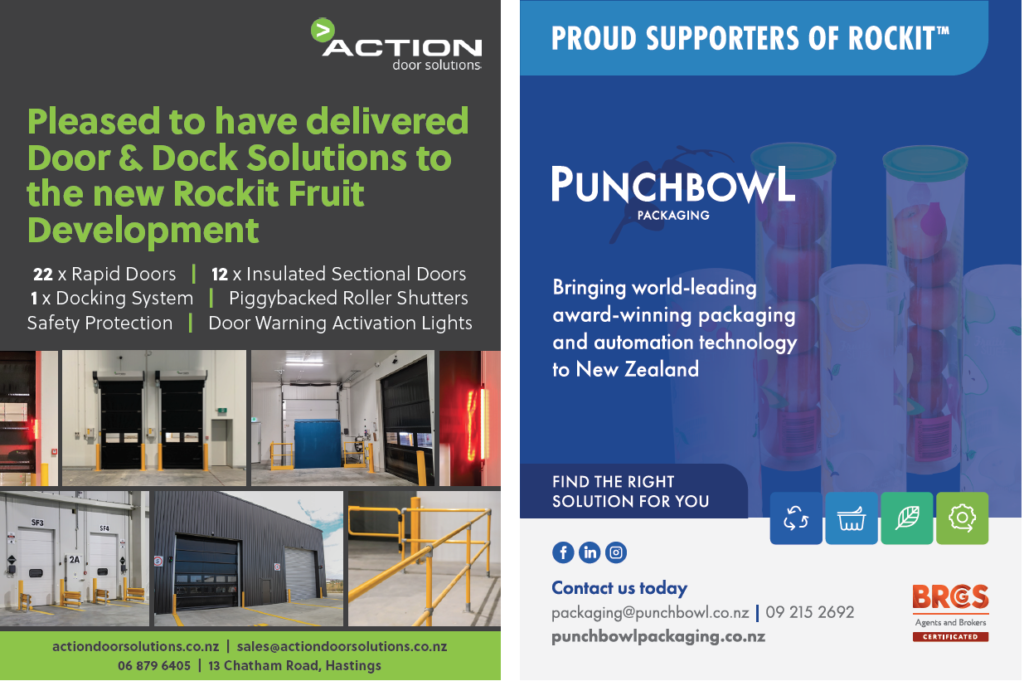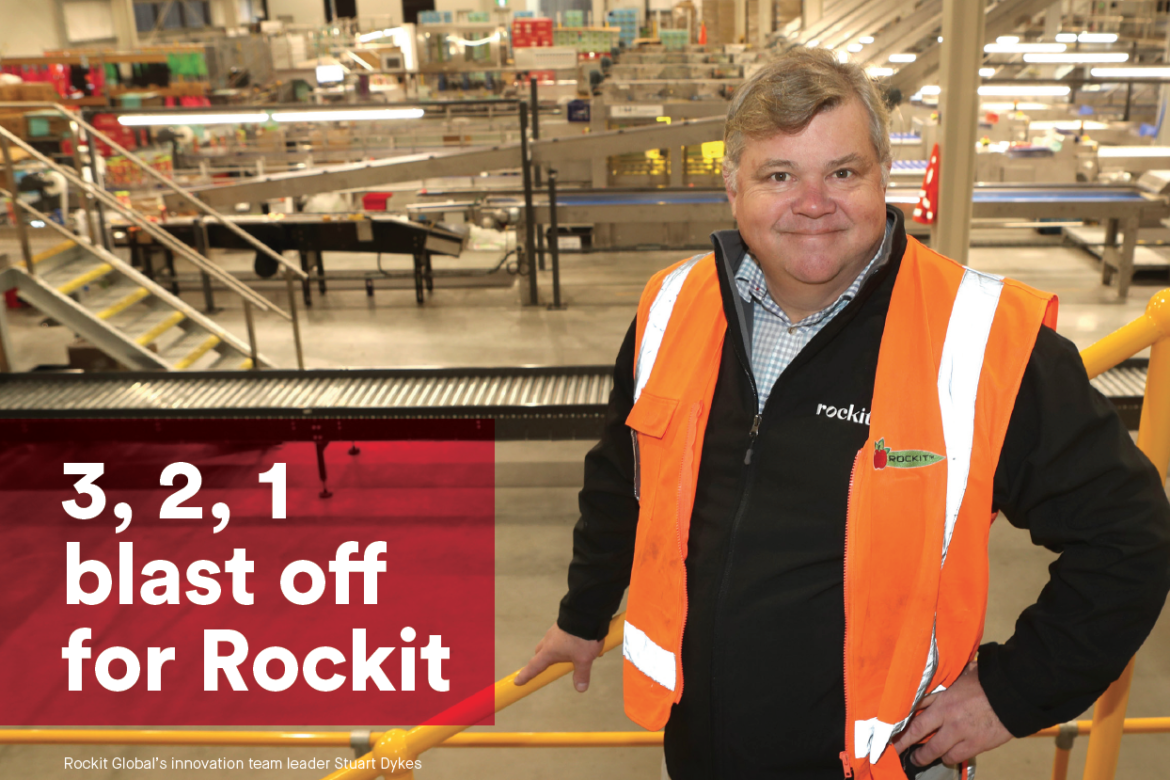Rockit Global is using technology and innovations in other sectors such as the kiwifruit sector and fast moving consumer goods (FMCG) to combat the major growth trajectory of the miniature-sized apple.
“The reason we can move like we are is that we look beyond the apple industry. We look at what other FMCG companies are doing, the likes of Heineken, which is at the forefront of automation and technology to improve productivity,” says Rockit Global’s Innovation team leader Stuart Dykes.
“It’s a journey and if we could compare ourselves to vehicles, we’ve gone from being a MINI to a Lexus and we’ll end up being a Ferrari.”
As more and more Rockit trees are planted in Hawke’s Bay and beyond, the business had to look at how innovations such as automation could reduce the reliance on manual labour across all parts of the supply chain.
With Rockit outgrowing its small packing facility in Havelock North, the board made the call to invest in a 20,600 m2 purpose-built post-harvest facility, Te Ipu, on land within the Irongate industrial zone in Hastings.
Stuart and his small team were charged with identifying production bottlenecks at every step of the journey for a Rockit apple, from orchard to consumer.
An engineer with a PhD in Food Science, Stuart has a background of working in the oil and gas sector and the wine sector, with a special interest in automation.
They identified that the single biggest barrier would be the ongoing lack of labour resources that impacts across all parts of the production process and that automation would be the answer.
“There’s a term in automation called ‘lights-out’, where you have no one in the facility, you turn the lights out and it just keeps going. That’s the ultimate goal.”
It seemed obvious for Stuart and his team to firstly look at the bottlenecks inside the facility.
One of the unique but challenging points of difference for Rockit apples is that they’re not packed into 20-kilogram cardboard boxes and sent offshore. Instead, they’re packed into consumer-ready packaging, in plastic tubes of varying sizes and quantity.
The facility is also a one variety facility, which means that the harvest season is more condensed and the facility is not used for other varieties.
To counter this, Rockit has a long chilled shelf life, with apples grown in New Zealand lasting for up to six months in cool stores.
The first bottleneck Stuart looked to automate was the packing of apples in tubes which would take a manual packer a minute to fill seven tubes, totalling just 35 apples.
Stuart also drew on local automation expertise from the likes of Hastings firms H & C Automated Solutions (a division of MHM Automation) and CR Automation, with overarching guidance from the local branch of global engineering firm Worleys.
He also looked at innovation within the kiwifruit sector, which has also experienced rapid growth.

“We took a lot of inspiration from kiwifruit, with its rate of growth and expansion, and asked questions about design, phasing the build, and how we think about building something that is going to be 10 times the size in 10 years.”
“We have a significant advantage in Hawke’s Bay in that we have some unbelievable talent within some high-tech businesses such as H & C Automated Solutions and CR Automation.
MHM Automation, a world leader in automating food processing systems with its centre of excellence for packaging and reverse packaging in Hastings, designed a customised robotic solution to pack the tubes.
MHM Automation global sales manager Nathan King says its four H & C tube-filling machines has enabled a three-fold increase in packing to 20 tubes and 100 apples a minute.
“The H&C tube-filling machines are a bespoke design to meet Rockit’s packing needs and include a vision system that identifies the height of each apple to allow the robots to select the right-sized apples to perfectly fill each tube,” Nathan says.
Stuart says overall, the facility is working well and is a vast improvement from Havelock North.
He’s full of praise for the many local businesses that went the extra mile to meet a deadline of mid-February when the first apples arrived from the orchards, including lead construction firm MCL Construction, engineering design consultants Strata Group and structural steel firm Red Steel and Kinetic Electrical.
“Every business that was involved stepped up from the early engagement with Strata and MCL through to the many engineering fabricator firms that pitched in along the way.
“There is a really good food network here, businesses that have expertise in food processing such as engineers, fabricators and automation, and they have excellent support networks of firms that also assisted.
“The end result is that we have a ‘great playbook’ for future facility development across the world.
Stuart and his team have now turned their automation thinking to the orchard. As more and more trees are planted, they know that they have to automate processes on-orchard.
“On-orchard is the next low-hanging fruit but automation is not quite ready at the moment; however, we can set up the orchards so that there is a better chance automated pruning and picking can take place in the future.



